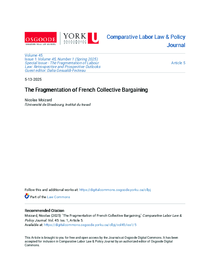The fragmentation of French collective bargaining
"Since the 1980s, collective bargaining in France has transitioned from a centralised model based on national labour laws and sectoral agreements to a decentralised system emphasising company-level agreements. Historically, law, and sectoral agreements provided strong, uniform worker protections, but reforms, including President Emmanuel Macron's 2017 executive orders, have allowed company agreements to override sectoral agreements and legislation, even when less favourable to employees. This shift aims to enhance flexibility and competitiveness but has fragmented protections. Small companies increasingly use direct referendums to approve agreements without formal negotiation, leading to reduced protections such as longer hours and lower pay. Many companies use a new category of collective agreements, the “collective performance agreements,” to adapt to economic challenges and alter the protected contents of employments contracts. However, many companies maintain existing balances. Simultaneously, some trends towards recentralisation are evident. Group-level agreements now allow corporate groups to standardise employment policies across subsidiaries. Many agreements rely on generic templates to comply with state-mandated collective bargaining on issues like gender equality. This evolving system underscores the tension between economic flexibility and maintaining workers' rights, with long-term impacts still unclear."
This work is licensed under the terms of the Creative Commons Attribution 4.0 International License (http://creativecommons.org/licenses/by/4.0/).
Digital
The ETUI is co-funded by the European Union. Views and opinions expressed are however those of the author(s) only and do not necessarily reflect those of the European Union or the ETUI.
